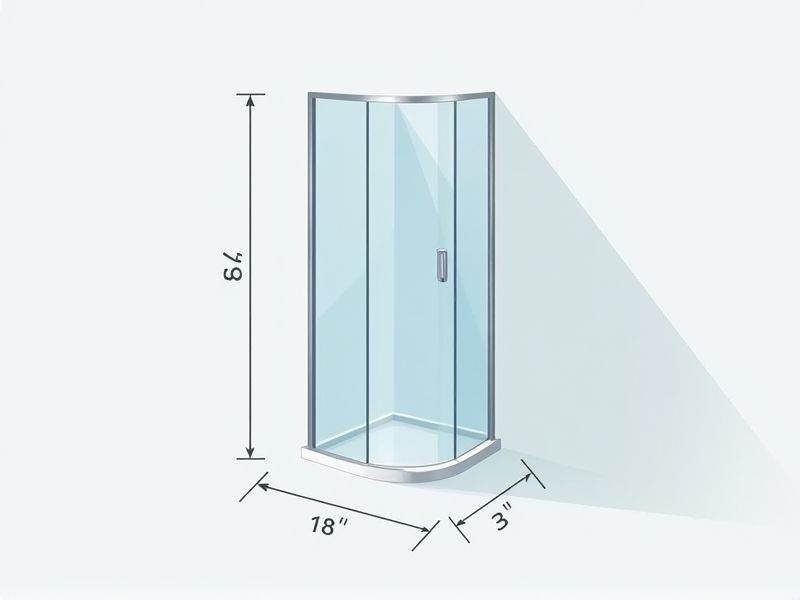
When selecting a shower door, knowing the standard dimensions can help you choose the right fit for your bathroom. Most common shower door widths range from 22 to 36 inches, with a typical height of about 72 inches. Measuring your shower opening accurately is essential, as custom sizes are also available to accommodate unique spaces. By understanding these standard dimensions, you can confidently shop for a shower door that meets both your functional needs and style preferences.
Width: 22-36 Inches
Shower door widths typically range from 22 to 36 inches, accommodating various bathroom sizes and layouts. A door width within this standard allows ease of entry and exit, ensuring a comfortable user experience. Choosing the right width can significantly impact your bathroom's overall functionality and style. Consider how your selected shower door integrates with existing fixtures for optimal aesthetic appeal.
Height: 68-72 Inches
The standard height for shower doors typically ranges from 68 to 72 inches, catering to various bathroom designs and user needs. This height range ensures effective water containment, minimizing splashes and enhancing the overall bathing experience. By selecting a shower door within these measurements, you can achieve both functionality and aesthetic appeal in your bathroom space. For optimal performance, consider your own height and the space available, ensuring a comfortable fit for all users.
Glass Thickness: 3/16-1/2 Inch
The standard glass thickness for shower doors ranges from 3/16 inch to 1/2 inch, significantly impacting durability and aesthetics. Thicker glass, such as the 1/2 inch variety, offers enhanced stability and a more luxurious appearance, making it a popular choice among homeowners. On the other hand, the 3/16 inch glass is often more budget-friendly while still providing adequate strength for most bathroom environments. When selecting your shower door, consider how the glass thickness affects both the safety and style of your shower space.
Frameless Or Framed Options
When choosing a shower door, consider the benefits of frameless and framed options. Frameless glass shower doors, typically made of 3/8" or 1/2" tempered glass, offer a sleek and modern aesthetic, enhancing the visual space of your bathroom. In contrast, framed shower doors provide additional support and structure, using aluminum or vinyl frames that can be more budget-friendly, starting around $200. Your decision may also factor in maintenance, as frameless doors are easier to clean due to fewer crevices, while framed options may require regular inspection for water damage over time.
Inline Vs. Bypass Doors
Inline shower doors consist of a single fixed panel alongside a hinged door, typically providing a sleek, modern aesthetic while maximizing space in smaller bathrooms. Bypass doors, on the other hand, feature two or more panels that slide past each other, ideal for wider openings and ensuring easy access without requiring additional clearance. When considering installation, inline doors often require precise measurements to ensure proper sealing, while bypass doors offer versatility in terms of layout and design. Your choice between these styles should reflect your space requirements, design preferences, and functionality needs, recognizing that inline doors usually suit minimalist decor, while bypass designs cater to traditional layouts.
Pivot Vs. Sliding Doors
When considering shower doors, the choice between pivot and sliding doors can significantly impact your bathroom's functionality and aesthetics. Pivot doors typically swing open on hinges, usually requiring about 24 inches of space for full access, making them ideal for larger bathrooms. In contrast, sliding doors operate on a track system, offering a space-saving solution while providing a sleek, modern look; they need about 2 to 3 inches of clearance from the wall for smooth operation. Your final decision should reflect both the space you have available and the style you wish to achieve in your bathroom design.
Ada Compliance Requirements
Shower doors must meet ADA compliance requirements to ensure accessibility for individuals with disabilities, typically requiring a minimum clear opening width of 32 inches. The height of the shower controls should be positioned no higher than 48 inches from the floor, with a reachable temperature control that allows for easy usability. Lever handles are preferred over knobs, promoting ease of use since they can be operated with a closed fist or forearm. Ensuring that the surface surrounding the shower door is slip-resistant and anchored properly helps to create a safe and functional bathing environment.
Custom Sizing Availability
A standard shower door typically accommodates sizes ranging from 24 to 48 inches in width and 72 to 80 inches in height, but custom sizing can enhance your bathroom's design. Custom doors allow for a perfect fit, ensuring minimal water leakage while maximizing space utilization. You can choose from various glass types, such as tempered or frosted, with thickness options often between 1/4 inch and 1/2 inch for durability. Custom designs can also include finishes like polished chrome or brushed nickel, giving you the flexibility to match your bathroom's aesthetic seamlessly.
Installation Space Considerations
When selecting shower doors, it's crucial to measure the installation space accurately, ensuring at least 72 inches in height and varying widths based on design preferences, often ranging from 28 to 60 inches. A typical threshold height should not exceed 6 inches to facilitate easy access and maintain water containment. The installation space should also allow for a minimum of 2 inches between the showerhead and the door to avoid splashing. You must also consider the wall space for hinges or tracks, as this can affect both the functionality and aesthetic appeal of your shower area.
Seal And Gasket Standards
Shower door seals and gaskets are crucial for preventing leaks, ensuring water remains contained within the bathing area. Industry-standard rubber or silicone materials are commonly employed, with specifications often adhering to waterproof ratings of at least IP67. Effective seals can reduce moisture accumulation and are typically rated for longevity, lasting upwards of 10 years with proper maintenance. To guarantee optimal performance, it's essential to measure your shower door accurately, as a tight fit can significantly enhance the efficacy of these sealing components.
